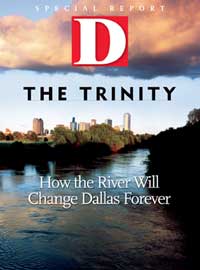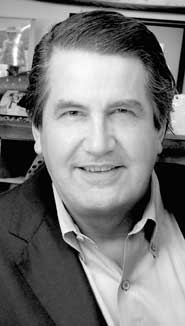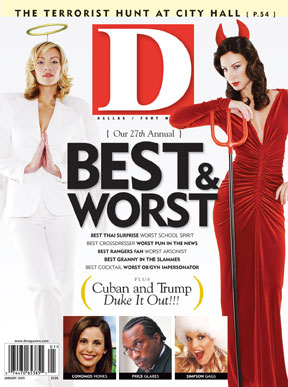In one of the opening scenes of a 1950 movie called Dallas, Gary Cooper, as U.S. Marshal Martin Weatherby, was pictured riding through a small pass and pausing at the ridge of a mountain before descending into town.
I remember watching the movie on television decades ago. I remember because everybody in our family burst out laughing. Obviously, none of the producers had ever been anywhere near Dallas.
Here we sit, a city built from scratch in one of the flattest places on earth. We don’t have mountains. We don’t have beaches. We don’t have an ocean or a port.
We don’t even really have a river. That’s why all the schemes to make something of the Trinity in the last 150 years have come to nothing. The Trinity is not a river—at least, it’s not a river like the Colorado in Austin or even the Brazos in Waco. It’s not a river; it’s a gully-washer. It can’t be navigated or turned into a town lake. Notions of doing either were doomed to failure by nature.
But it can be a park. It can be one great, curving, jogger-filled swath of green that becomes the emerald center of this city—and it can be that in my lifetime.
Earlier this year, the editors decided to investigate the long-promised but (seemingly) endlessly delayed Trinity River Project: its present status, funding, politics, and potential. The result is an 88-page study—too much to squeeze into a regular issue—published as a special report called The Trinity: How the River Will Change Dallas Forever. D Magazine subscribers, who constitute the broadened leadership class of the city, will receive this issue as a bonus to their regular subscriptions. Many of Dallas’ leading businesses and law firms joined together to help us mail another 120,000 copies to business owners and executives in the four-county region.
A team of editors, reporters, and photographers looked at every aspect and walked many acres of the proposed

Here’s the bottom line in four sentences:
It’s going to happen.
It’s on schedule.
It’s massive and complex, involving some 15 different layers of government at the federal, state, and local levels.
And, as we announced on the cover of our special report, it’s going to change Dallas forever.
Dallas is on the verge of building one of the largest urban parks in the world, with
6 miles of river and 6,000 acres of hardwood forest, adorned with at least two architecturally stunning bridges soaring 40 and 30 stories, respectively, over pathways, a whitewater course, parkland, and river. The project, in its entirety, will be 10 times larger than New York City’s Central Park. The major part of it will be open by 2011.
My one regret is that we can’t invite Gary Cooper here to see it. —Wick Allison
To order your copy of The Trinity: How the River Will Change Dallas Forever, send $5 for postage and handling to Special Report, 4311 Oak Lawn Ave., Ste. 100, Dallas, TX 75219. Or place your order at www.dmagazine.com.






